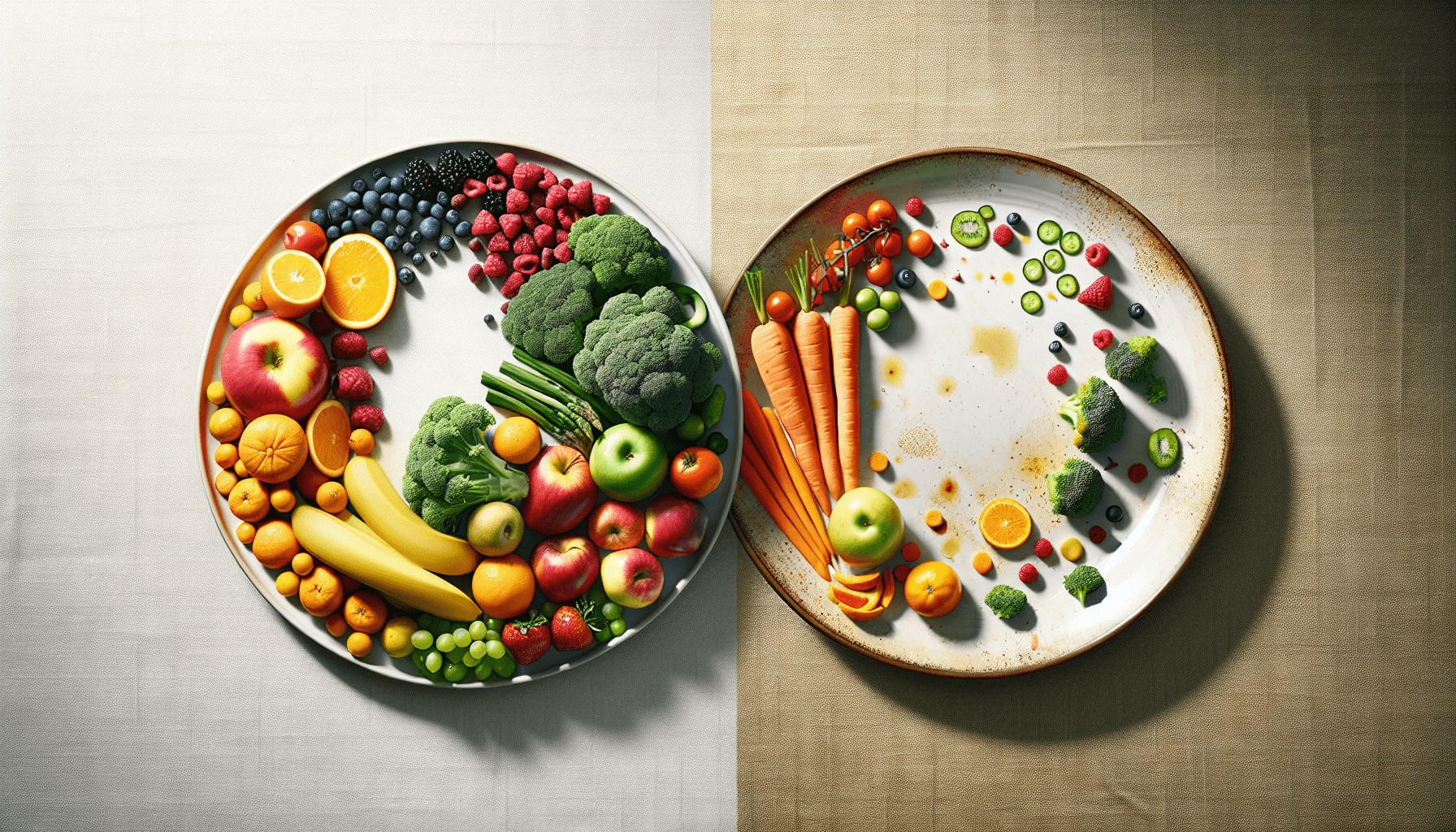Embarking on a journey for better health, you’ve likely pondered the impact of a vegetarian diet on your cholesterol levels. In the vibrant tapestry of nutritional choices, understanding how plant-based foods influence your heart’s wellbeing is both empowering and essential. This article illuminates the relationship between a vegetarian diet and cholesterol, offering valuable insights into how eschewing animal products can lead to improved cardiovascular health. By embracing the colorful world of fruits, vegetables, legumes, and grains, you might find your cholesterol levels becoming as harmonious as the meals on your plate.
Understanding Cholesterol: The Basics
Definition and Types of Cholesterol
Cholesterol is a waxy substance found in your blood that comes in different forms. The two main types of cholesterol are low-density lipoprotein (LDL), often termed “bad” cholesterol, and high-density lipoprotein (HDL), commonly known as “good” cholesterol. LDL is considered bad because it can build up on the walls of your arteries, causing them to narrow and potentially leading to heart disease. Conversely, HDL is good because it helps remove other forms of cholesterol from your bloodstream.
Functions of Cholesterol in the Body
You might wonder why your body needs cholesterol if it can cause health issues. Well, cholesterol actually plays several essential roles. It’s necessary for the production of hormones, vitamin D, and substances that help you digest foods. It’s also a crucial component of cell membranes, aiding in maintaining their structure and function.
Causes and Risks of High Cholesterol
High cholesterol can be caused by a variety of factors. Your diet plays a significant role, especially the intake of saturated and trans fats, which can raise your LDL levels. Additionally, factors like genetic makeup, lack of exercise, obesity, and smoking can contribute to elevated cholesterol levels. The risks associated with high cholesterol are serious – primarily, it increases your risk for coronary heart disease, heart attack, and stroke.

Components of a Vegetarian Diet
Different Types of Vegetarian Diets
There are several types of vegetarian diets, each with different restrictions. Lacto-vegetarians include dairy products but avoid eggs and meat. Ovo-vegetarians eat eggs but exclude dairy and meat. Lacto-ovo vegetarians include both eggs and dairy but do not eat any meat. Meanwhile, vegans avoid all animal products, including dairy, eggs, and often honey.
Common Foods Consumed by Vegetarians
As a vegetarian, your diet is likely rich in fruits, vegetables, grains, nuts, seeds, and legumes. Dairy products and eggs can also be a part of vegetarian diets, depending on the type you follow. These foods are not only delicious but are also full of essential nutrients.
Nutrients of Concern for Vegetarians
When adopting a vegetarian diet, you must watch out for certain nutrients that are more commonly found in animal products. These include protein, iron, calcium, zinc, vitamin B12, and omega-3 fatty acids. Paying close attention to these nutrients ensures that your vegetarian diet is well-rounded and healthy.
The Relationship Between Diet and Cholesterol Levels
Impact of Animal Products on Cholesterol
Animal products, particularly those high in saturated fats, can raise your LDL cholesterol levels. These include red meats, full-fat dairy products, butter, and certain processed foods. Moderating your intake of these items or avoiding them altogether can be beneficial for your cholesterol levels.
Role of Plant-Based Diets in Cholesterol Management
Plant-based diets, including vegetarian diets, tend to be lower in saturated fat and high in fiber, which can help manage cholesterol levels. The absence of animal fat and the presence of various plants and grains can help lower LDL cholesterol and may potentially improve HDL levels.
Comparative Studies on Dietary Impact on Cholesterol
Research has shown that vegetarian diets can effectively lower cholesterol levels. In comparative studies, vegetarians typically have lower cholesterol levels than non-vegetarians, suggesting a link between plant-based eating and heart health.
Benefits of a Vegetarian Diet on Cholesterol
Reduction in LDL (Bad) Cholesterol
One of the most significant benefits of a vegetarian diet is the potential reduction in LDL cholesterol. Thanks to the diet being high in fiber and low in saturated fat, you can experience a considerable decrease in the “bad” cholesterol that contributes to heart disease.
Potential to Increase HDL (Good) Cholesterol
While the main focus is often on lowering LDL cholesterol, a vegetarian diet can also have positive effects on your HDL levels. By incorporating healthy fats from plants, you can help improve your HDL cholesterol, which aids in the elimination of other forms of cholesterol from your body.
Long-term Effects on Cholesterol Levels
Adopting a vegetarian diet isn’t just about immediate benefits. Long-term adherence to a diet rich in fruits, vegetables, and whole grains can lead to sustained improvements in cholesterol levels and overall heart health.
Challenges in a Vegetarian Diet for Cholesterol Control
Identifying Hidden Cholesterol in Vegetarian Foods
While a vegetarian diet generally has lower levels of cholesterol, it’s important to be aware of hidden sources. Some processed vegetarian foods can be high in fats that contribute to cholesterol. It’s vital to read labels and be mindful of the fat content, even in plant-based products.
Balancing Macronutrients for Optimal Cholesterol
Achieving the right balance of macronutrients – carbohydrates, fats, and proteins – is crucial for cholesterol control on a vegetarian diet. Focus on complex carbohydrates, healthy fats, and a variety of protein sources to keep your cholesterol in check.
Myths vs. Facts about Vegetarian Diets and Cholesterol
There are many myths about vegetarianism and cholesterol. Some people believe that vegetarians can’t have high cholesterol, which isn’t true. While a vegetarian diet can help manage cholesterol levels, it’s still important to make healthy choices within the diet.
Incorporating Heart-Healthy Foods into a Vegetarian Diet
Soluble Fiber and Its Effects on Cholesterol
Soluble fiber, found in foods like oats, beans, lentils, and certain fruits, can help lower your LDL cholesterol. This type of fiber dissolves in water to form a gel-like substance in the gut, which helps to reduce the absorption of cholesterol into your bloodstream.
Importance of Nuts and Seeds
Nuts and seeds are excellent sources of healthy fats, protein, and fiber. Including them in your diet can contribute to heart health and assist in managing cholesterol levels. Options like almonds, walnuts, and flaxseeds are particularly beneficial.
Benefits of Plant Sterols and Stanols
Plant sterols and stanols are compounds that mimic cholesterol in the body, helping to block its absorption. They are naturally found in small amounts in many plant foods and are often added to certain products like margarines and orange juice.
Importance of Exercise in Conjunction with a Vegetarian Diet
How Physical Activity Influences Cholesterol Levels
Exercise is another key factor in managing cholesterol levels. Regular physical activity can help raise HDL cholesterol and lower LDL cholesterol and triglycerides, boosting your overall heart health.
Combining Diet and Exercise for Cholesterol Management
For optimal cholesterol management, it’s recommended to combine a well-planned vegetarian diet with regular exercise. This two-pronged approach is more effective than focusing on either diet or exercise alone.
Exercise Recommendations for Vegetarians
As a vegetarian, engaging in a variety of physical activities can support your cholesterol goals. This includes aerobic exercises like walking, cycling, or swimming, as well as strength training to maintain muscle mass and bone health.
Vegetarian Diet Planning for Optimal Cholesterol
Creating a Balanced Vegetarian Meal Plan
A balanced vegetarian meal plan is essential for optimal cholesterol management. Include a variety of fruits, vegetables, whole grains, and protein sources to ensure you’re getting a wide range of nutrients.
Recommended Nutrient Intakes for Cholesterol Control
When planning your meals, aim for nutrient-rich foods that can help control cholesterol. These include high-fiber foods, lean protein sources like legumes, and heart-healthy fats from avocados and olive oil.
Supplementation and Fortified Foods
Since some nutrients may be harder to obtain on a vegetarian diet, considering supplementation or fortified foods can be wise. This is particularly true for vitamin B12, omega-3 fatty acids, and possibly vitamin D and calcium.
Understanding Soy and Its Influence on Cholesterol
Soy-Based Foods and Their Nutrient Profiles
Soy-based foods are a staple in many vegetarian diets. They’re high in protein, low in saturated fat, and contain phytochemicals that may offer health benefits. Tofu, tempeh, soy milk, and edamame are all nutritious soy foods to consider including in your diet.
Study-Based Evidence on Soy and Cholesterol Reduction
Studies have suggested that soy protein can contribute to lowering cholesterol levels. Incorporating soy into your diet may help you achieve a significant reduction in both total cholesterol and LDL cholesterol.
Incorporating Soy into a Cholesterol-Lowering Diet
To utilize the cholesterol-lowering benefits of soy, aim to include a variety of soy products in your diet. This can be as simple as having a glass of soy milk, snacking on edamame, or using tofu as a meat substitute in your favorite recipes.
Monitoring Your Progress and Health
Tracking Cholesterol Levels and Dietary Changes
To see the effects of your vegetarian diet on your cholesterol, keep track of your intake and monitor your cholesterol levels regularly. This can help you make informed adjustments to your diet and lifestyle.
Biannual or Annual Health Screenings
Biannual or annual health screenings are important for observing the long-term impact of your dietary choices on cholesterol levels and overall health. Regular check-ups with your healthcare provider will enable you to catch and address any issues early.
Role of Professional Guidance from Dietitians
Consider consulting with a dietitian, especially one who specializes in vegetarian diets. Professional guidance can help tailor your diet to meet your cholesterol management goals while ensuring you receive all necessary nutrients.




